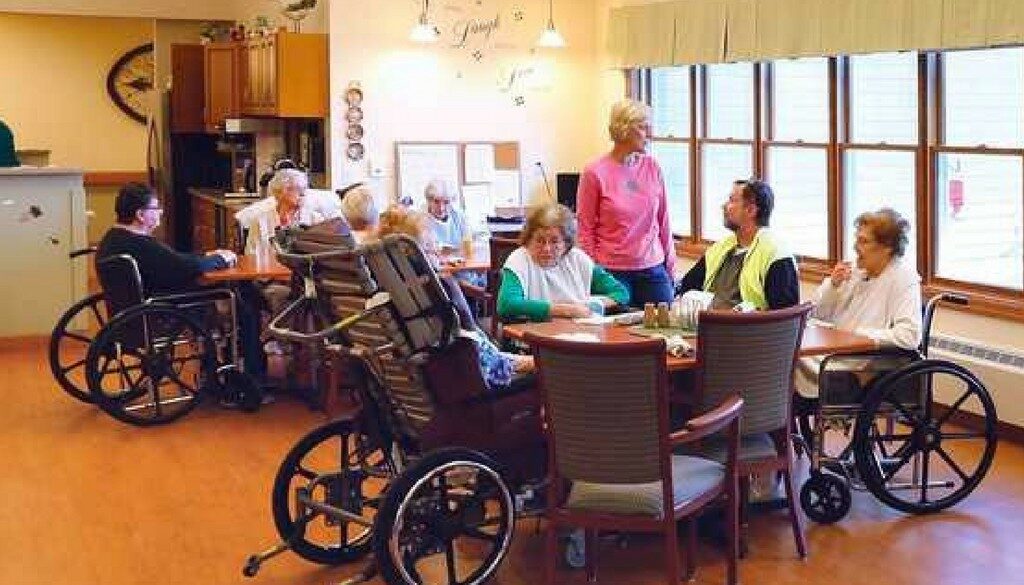Transitioning Your Loved One to a Nursing Home
Knowing when the right time is to look into nursing homes is never easy. It becomes more and more taxing on you to take care of them, which can leave you drained. The Neighbors of Dunn County understand the duress you are under and will do everything in our power to lessen your strain. With our expert, caring staff, it is our priority to be sure that the transition from your home to ours goes smoothly. Care Conversations recently posted an article explaining what to anticipate when the day comes for your loved one to transition to a nursing home. These tips allow insight into what to expect and how to handle their objections:
The First Day
As with any move, the day your loved one arrives at the Skilled Nursing Care center will likely be hectic and exhausting. Care transitions are not only physically taxing, they also take a notable emotional toll. It’s a tough day, but remember, there are brighter ones to come.
If you were providing in-home care, you may be at a loss as to what to do. It may feel odd to have time on your hands. You may feel like you’re banging around an empty house. Have a few books ready to read on the first night, including When Love Gets Tough: The Nursing Home Decision by Doug Manning. Relax with some music or turn on a movie that makes you laugh really hard or cry. When you can, sleep. And know that you’re doing your best.
The First Week
The first week may be a bit confusing for both you and your loved one. You’re getting used to a new routine, a new schedule, a new way. You may feel like you’re navigating life without a map. Staff can help you adjust. If you’re not sure whom to ask for help, ask to speak with a social worker.
Your loved one may make negative comments. Your loved one may say he or she wants to go home. Acknowledge the desire. You might say, “I know, Mom. I wish you could too. What’s hard for you today?” Then listen. If you have a suggestion, share it but don’t force one. Listening often can be the most powerful solution. If your loved one begins to cry, just offer comfort and a hug.
After your loved one has had time to express feelings, say, “I appreciate you’re making the best of this. I think we make a great team.” You also may want to redirect with a suggestion, such as “Let’s take a walk down the hall” or “Let’s get a cup of coffee.”
The conversation about going home will tug on your heartstrings and nag your conscience. Just as you gave your loved one room for emotions during the decision to move, do so now. Empathize, offer comfort. Keep your feelings separate from your loved one’s. Turn to family, friends and others in your support system when you have your own tough moments.
If you struggle with how to address your loved one’s comments, ask the center’s social worker for help. Also, check to see if the center has a support group or a Family Council to share solutions that work for them.
During the first week, you’ll better understand the routines of the facility: what it’s like during meals, shift change and at different times during the day. You’ll begin to recognize familiar faces. Write down any questions you may have; you can bring them to your loved one’s first care plan meeting.
During the first week, others close to you will hear news of your loved one’s move. When they call to check in on you, you may feel obligated to explain your decision. You only have to share as much information as you’d like. You can simply say, “It was just getting too tough at home. This is an adjustment for both of us. We appreciate your support.”
You may wonder if you’re calling or visiting too much. Call and visit as often as you’d like. Use your gut as a guide. You also may be so tired that you find yourself too exhausted to visit as often as you’d like. Catch up on your rest and then visit. You can call the center to check on your loved one and ask others to increase their visits in the meantime. Visits will be more enjoyable after you recover from the stress of the decision and all that led to it. See more tips for successful visits below.
The First Month
The first month will be, in some ways, a blur. And in other ways, it will seem like a year has gone by. You and your loved one will have settled into a routine and will be familiar with the staff. You’ll have attended your loved one’s first care plan meeting.
You may continue to second-guess your decision. Remember that a bad day doesn’t make a bad decision. When you have a bad day, consider the reason. What’s within your control? Can staff help you find a solution? Ask them. Are you beating yourself up for not doing more? Realize you can only do so much. Know that you will also have good days when you know the decision was right.
Take an objective look at your visiting schedule. How do you feel about how often you visit? Create a workable schedule for visits and phone calls. You also may want to include others in your scheduling efforts so that your loved one has a steady flow of visitors and conversation.
The Neighbors of Dunn County work tirelessly to ensure a smooth transition for your loved one. Following these tips can help you and your loved one feel more comfortable and confident in this decision.
Source: Care Conversations




